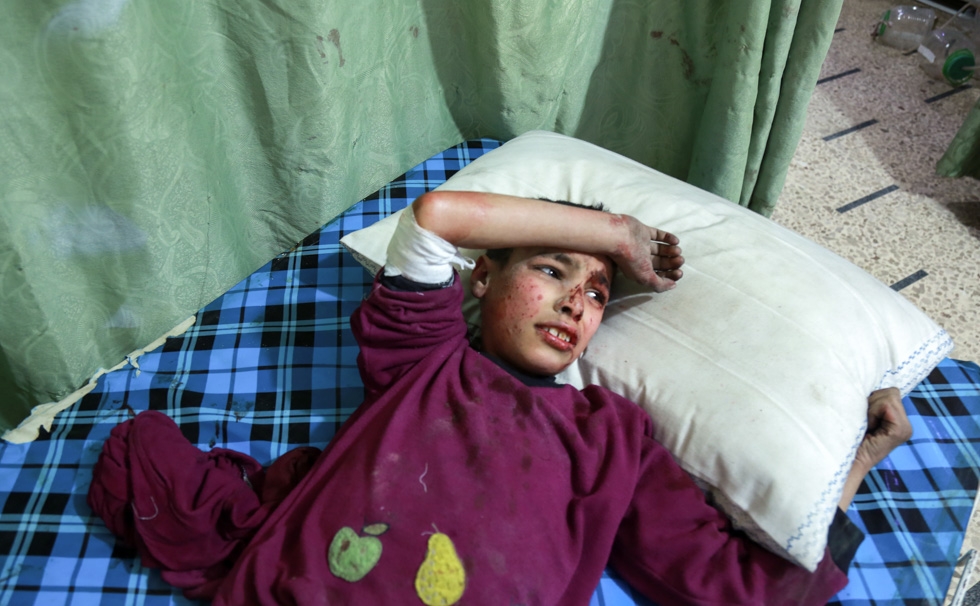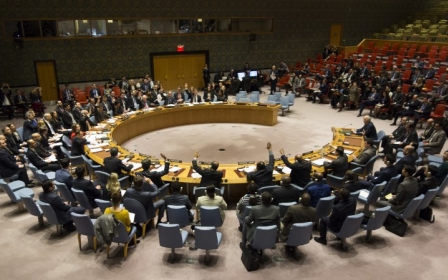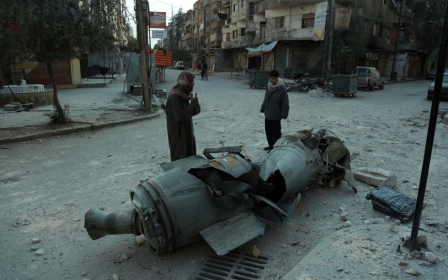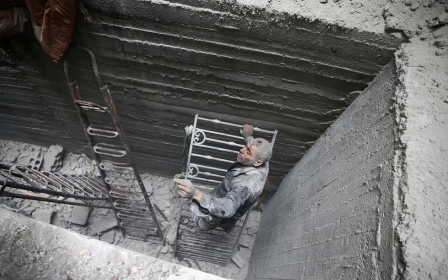Iran says attacks in Syria's Ghouta will continue as further strikes reported

Iran said attacks would continue on rebel-held areas near Damascus, where clashes were reported on Sunday between rebels and government forces despite a UN resolution demanding a ceasefire across the country "without delay".
Warplanes and artillery hit some towns in the Eastern Ghouta enclave, said residents, rescuers, and the Syrian Observatory for Human Rights (SOHR). The SOHR, a UK-based war monitoring group, said Sunday's bombing was less intense than the attacks over the past week.
In Douma, the main town in Eastern Ghouta, residents woke to the sounds of fresh air raids and artillery strikes on Sunday morning, according to an AFP correspondent in the town. Rocket and artillery fire also hit at least three parts of Eastern Ghouta on Sunday, according to Rami Abdel Rahman, chief of the SOHR.
Iran's military chief of staff General Mohammad Baqeri said on Sunday that Iran and Syria would adhere to the ceasefire but that Iran would continue attacks in Damascus suburbs held by "terrorists".
"As the [UN resolution] says, parts of the suburbs of Damascus, which are specifically controlled by the terrorists of the Nusra Front and other terrorist groups, are not subject to ceasefire," Baqeri said according to Iranian media, adding that "clean-up [operations] will continue there".
The latest strikes come despite a unanimous vote at the United Nations Security Council in New York Saturday for a resolution demanding a 30-day ceasefire across Syria to allow aid convoys to reach besieged areas.
Eastern Ghouta on the outskirts of Damascus has been besieged by Syrian government forces since 2013. Home to 400,000 people, it has been the target of a fierce bombardment in the last week. At least 520 are believed to have died, including more than 100 children, according to the SOHR.
Resolution reached after diplomatic wrangling
In separate statements, Jaish al-Islam and Faylaq al-Rahman, the two main rebel groups in eastern Ghouta, welcomed the ceasefire but said they would retaliate if attacked.
Jaish al-Islam "is committed to protecting humanitarian convoys," it said, but it would "immediately respond to any violation" committed by government forces.
Faylaq al-Rahman said: "We confirm our full commitment to the [UN] resolution ... Nevertheless, we reserve the right to defend the civilians of eastern Ghouta in case of renewed attacks."
UN diplomats say Saturday's Security Council resolution was watered down to ensure it was not vetoed by Russia, which has provided diplomatic and military support to Assad's . government.
Language specifying that the ceasefire would start 72 hours after the adoption was scrapped, replaced by "without delay," and the term "immediate" was dropped in reference to aid deliveries and evacuations.
In another concession, the ceasefire will not apply to operations against the Islamic State group or al-Qaeda, along with "individuals, groups, undertakings and entities" associated with the militant groups.
Syria's former al-Qaeda affiliate is present in Eastern Ghouta and Assad's government routinely describes all of its opponents as "terrorists".
UN Secretary-General Antonio Guterres, who has described eastern Ghouta under the bombardment as "hell on Earth," said the ceasefire must be "immediately" implemented.
Turkey, which is also party to the conflict, welcomed the UN resolution on Sunday the nation’s foreign ministry spokesman said in a statement.
Syria’s northern neighbour had previously been a staunch supporter of rebel groups fighting government forces. Its armed forces and allied Syrian rebel group launched an ongoing operation in January to capture the region of Afrin in northern Syria, which is controlled by the pro-Kuridsh People's Protection Units (YPG).
Turkey's Deputy Prime Minister, Bekir Bozdag, said on Sunday that the resolution would not affect the operation in Afrin against the YPG. Turkey considers the YPG to be an extension of the Kurdistan Workers' Party (PKK), which has been waging an insurgency against the Turkish state for four decades and is considered a terrorist organisation by Turkey, the US and the EU.
The YPG, however, has received significant support from the US in its fight against IS in Syria and is not considered a terror group by Washington or the EU.
'We are used to betrayals'
In Ghouta, news of the UN vote was greeted with a shrug. "I don't think this decision will be implemented. It will be respected neither by the regime nor Russia," said Douma resident Abu Mazen.
"We can't trust Russia or the regime. We are used to their betrayals," he added.
Several previous ceasefire attempts have quickly unravelled during the eight-year civil war, which has killed 340,000 and forced 11 million people out of their homes.
Russia has been pressing for a negotiated withdrawal of rebel fighters and their families from Eastern Ghouta, like the one that saw the government retake full control of Syria's second city Aleppo in December 2016. But rebel groups have refused.
The rebels in Eastern Ghouta have also been firing into government-controlled Damascus, where six civilians were wounded on Saturday, state media said.
Around 20 people have been killed in eastern districts of the capital since last Sunday, according to state media.
New MEE newsletter: Jerusalem Dispatch
Sign up to get the latest insights and analysis on Israel-Palestine, alongside Turkey Unpacked and other MEE newsletters
Middle East Eye delivers independent and unrivalled coverage and analysis of the Middle East, North Africa and beyond. To learn more about republishing this content and the associated fees, please fill out this form. More about MEE can be found here.




